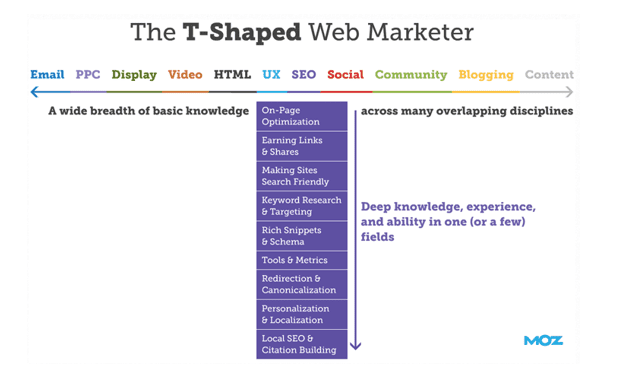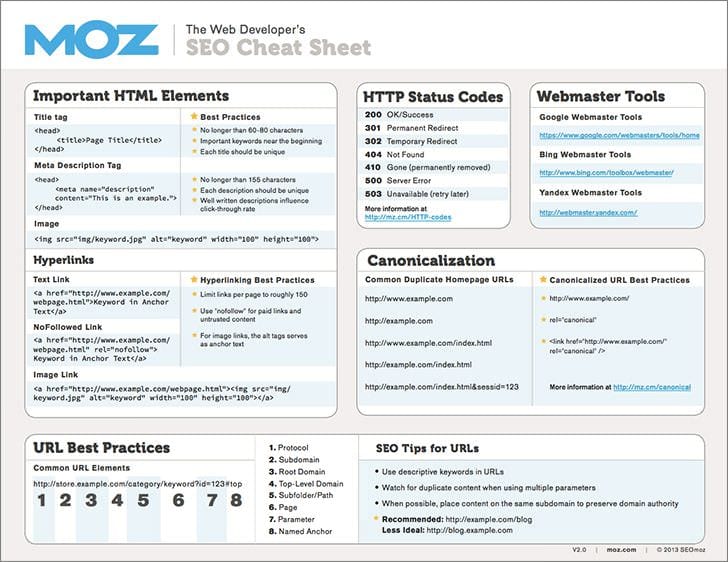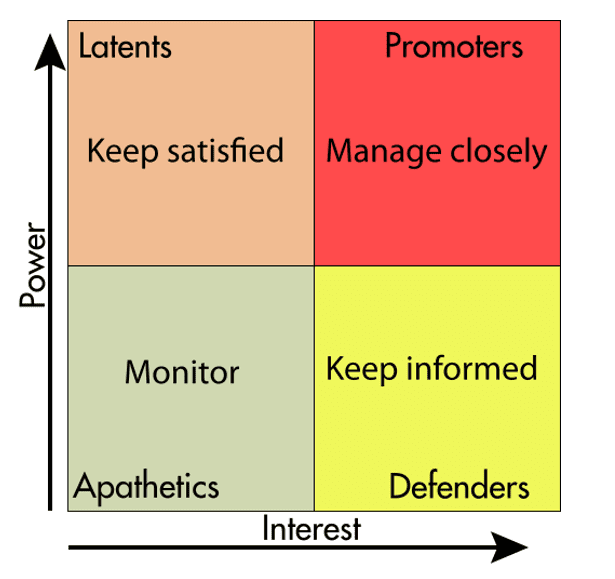The top skills and attributes of an effective in-house SEO Manager
To be a truly effective digital marketer, it’s important to develop a good range of skills and experience regardless of which digital discipline (SEO, UX, analytics, social media) you practice. For a couple of years now I’ve been using the T-shaped marketer approach as a template for my professional development, something that both Distilled and Rand Fishkin from Moz have explained in detail.
As Rand Fishkin explains: ’T-Shaped basically refers to having a light level of knowledge in a broad array of skills, and deep knowledge/ability in a single one (or a few).’
Essentially, breadth breeds respect and overlapping knowledge yields creativity. There are great benefits for digital marketers who, whilst specialising in a single area or discipline (e.g. SEO), develop a lighter level of knowledge across a broader spectrum of skills (e.g. social media, content marketing, web analytics etc).
Simon Swan discussed the T-shaped marketer approach for Smart Insights in 2013 and outlined the following five reasons to consider life as a T-shaped marketer:
- 1. Develop organisational integration
- 2. Know your audience
- 3. Integrate technical and general marketing skills
- 4. Expand digital knowledge
- 5. Think and act like a start-up
What makes a great in-house SEO Manager?
With the T-shaped marketer approach in mind and an appreciation of how SEO has evolved over the last 5-7 years, what skills should the modern SEO Manager possess? The days of creating sites using ‘thin’ content and building cheap links are long gone. Today, genuine relevance through quality content and earned links requires the modern SEO manager to leverage a wide array of skills to ensure they drive rankings and quality organic traffic to the websites they’re responsible for.
Smart Insights provides some very helpful guidance on the roles and responsibilities for various digital marketing jobs. However, for this post I’m going to look more broadly at the skills I believe are essential for the modern SEO Manager include:
1. A strategic perspective
Modern SEO Managers must have the ability to develop a strategic perspective and tie their SEO plans to the goals and objectives of the business. Having a strategic perspective enables you to define an approach and create a long-term vision for how you see SEO adding value to a business over time.
2. A clear understanding of best practice tactics
From strategy, tactics should follow. The modern SEO Manager should have a good appreciation of the most effective SEO tactics at their disposal. With search engines becoming ever more sophisticated, it’s not possible to simply ‘chase the algorithm’.
SEO Infographics
Below are a set of very helpful infographics outlining some of the best tactics for on-page, off-page and technical SEO:
-
On-page SEO
Source: http://moz.com/blog/visual-guide-to-keyword-targeting-onpage-optimization
-
Off-page SEO

Source: http://searchengineland.com/seotable - recently updated for 2015
-
Technical SEO CribSheet
Source: http://moz.com/blog/the-web-developers-seo-cheat-sheet-2013-edition
3. Content marketing
Whilst content marketing is a key tactic and could therefore reside in the sub-section above, I’ve singled out content marketing for specific focus due to the importance it plays in today’s modern SEO landscape.
As highlighted in my post on content marketing trends for 2015, there are clear benefits to integrating SEO and content marketing, including:
- Keyword research
- Campaign planning
- Developing quality content
- Content distribution
- Analysis
4. Analysis and insight
The modern SEO Manager must have the skills to effectively analyse performance and generate insight. Whilst some companies (usually medium-large) may have analytics or insights teams, the ability to competently conduct analysis of their own will put SEOs at a huge advantage.
There are two areas where I believe a good SEO manager can add value:
- 1. A clear view of core KPIs and success metrics: An understanding of what core KPIs to use, against which you can measure how you’re performing vs. the strategy and filter insight back into the operational SEO process.
- 2. What is the competition doing? How do you compare? Effectively benchmark performance vs. competitors, providing you with an understanding of gaps, opportunities and areas for improvement.
5. Brand Management
A great SEO Manager will not look to build content and optimise websites in isolation (see point 1 - ‘a strategic perspective’above). They will need to have an appreciation of the brand and what the company stands for, all of which will help inform the content and SEO roadmap.
Whilst SEO Managers need not be branding experts, I believe they should be confident articulating what a brand is and how it impact the work they do.
Simon Sinek, Author of ‘Start with Why’, uses a great concept called the ‘Golden Circle’ to question why brands exist and therefore what they do and how they do it:
6. People management and team building
Many SEO Managers work alone, sometimes the sole subject matter expert in the company. However, whether within an SME or a large corporation, at some stage many SEO managers will be looking to either manage an existing team or to build one of their own.
People management is difficult skill to master but one that all great SEO managers must possess. As teams become bigger, the manager must have the ability to juggle resources, motivate the team and ensure that the strategy is being executed.
The Harvard Business Review suggests the following key components to people management: Selection, Expectation setting, Motivation and Development.
7. Stakeholder management
Modern SEOs must have the ability to effectively manage the concerns and interests of multiple stakeholders. It’s not possible to simply manage SEO in isolation; instead SEO should be considered from an integrated perspective, i.e. how does it tie in with other areas of the business.
As with people management, stakeholder management is a learned but very important skill, involving a blend of understanding, astute analysis and empathy Some of the key stakeholders I would suggest an SEO Manager must be aware of include:
- Senior management
- Ecommerce
- Brand
- PR
- Procurement
- Agency
Where do the various stakeholders lie on a Power/Interest matrix?
A stakeholder’s position on within the matrix indicates the relative power and interest in your work and the actions you may need to take with them.
Summary for recruiting your SEO Manager
Managing SEO today requires more than being an adept technician and practitioner. The modern SEO Manager must possess a wide array of skills and competencies, enabling them to effectively manage strategy and set a vision whilst simultaneously be aware of, and execute, tactics that cover on-page, off-page and technical elements of SEO.
The modern SEO Manager must also be an astute manager of people and multiple stakeholders, as well as possess an in-depth understanding of the brand.
A ‘T-shaped’ skill provides a sound template for how effective SEO managers can approach their career development. Managers should continue to develop their skills within the discipline of SEO, but also develop broader skills in other technical areas (such as analytics, PPC and web development) and softer skills (people management, communication etc).
from Blog – Smart Insights http://www.smartinsights.com/search-engine-optimisation-seo/seo-strategy/whats-the-digital-marketing-skill-set-for-an-seo-manager/
via Tumblr http://euro3plast-fr.tumblr.com/post/150492117579





No comments:
Post a Comment